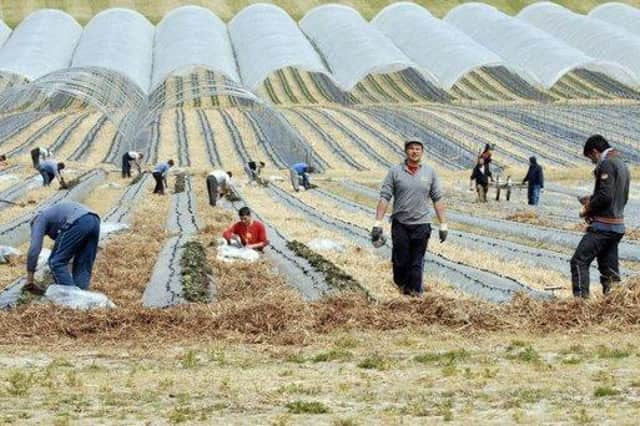Research reveals more local workers may not be the answer to labour shortage


In the midst of a labour crisis that has seen Scottish crops go unpicked, the industry is frequently challenged and told by some, including Government, that the solution is simply for soft fruit and vegetable farms to employ more local people.
However, a recent survey of NFU Scotland’s horticultural members, carried out by Policy Manager David Michie, failed to find any farm that had a positive experience when recruiting UK staff.
Advertisement
Hide AdAdvertisement
Hide Ad· One Scottish fruit and veg business offered 100 contracts of employment to UK applicants; six were accepted and only three turned up to work.
· The retention rate for EU and other migrant workers on Scottish soft fruit and veg farms is over 80 percent. The retention rate for UK workers is 32 percent.
· Worker shortages on Scottish soft fruit and vegetable farms are around 20 percent this year.
David said: “The UK’s food and farming industries are facing a labour crisis. It can be seen in the newspaper headlines and in your local supermarket’s empty shelves.
Advertisement
Hide AdAdvertisement
Hide Ad"Incredibly, the British public are being told to start planning for Christmas now, over a full month before Halloween!
“Scotland’s horticultural businesses have been on the front line of this crisis for two years now.
"Brexit has meant an end to freedom of movement for EU workers. This barrier been stacked on top of major Covid-19 barriers, and a migrant workers’ visa scheme that has not worked well for our members.
"These problems have resulted in fewer workers picking fruit and vegetables: our data shows worker shortages of around 20% for horticulture businesses this year, which means increased costs and crop losses.”
Advertisement
Hide AdAdvertisement
Hide AdSo why have these businesses not been employing more workers from the UK? According to David, the survey shows that it is not for lack of trying.
NFU Scotland recently surveyed its members, asking them to comment on their experiences of recruiting workers from the UK.
He reports: “Not one response was positive. We heard from one business who offered 100 UK applicants offers of employment in early 2020. Only six of those applicants accepted the offer. Only three of those actually turned up for work.
“The few people who do accept an offer of employment do not generally stay.
Advertisement
Hide AdAdvertisement
Hide Ad“Our data shows a strikingly low retention rate of only 32% for UK workers.
" This compares to an 82% retention rate for EU workers, and an 81% retention rate for other migrant workers.
"These recruitment and retention challenges are a major headache for horticultural businesses.”
And he adds: “So what is the problem? Is the work so bad? Is it that poorly paid? The answer to these questions is no.”
The industry has changed massively in the past few decades.
Advertisement
Hide AdAdvertisement
Hide AdThe output value of Scottish soft fruit grew by £68m to £128m (an increase of 112%) over the decade to 2015; and vegetables were up £48m to £116m (+72%).
Access to high quality labour from Europe has contributed significantly to this growth.
The Scottish horticulture sector has been a huge success. It now produces large volumes of high-quality produce that has significantly improved Scotland’s ability to feed itself.
David said i t has become a success by restructuring, including providing accommodation on-site, investing and innovating to extend the availability of fruit and vegetables through the year, and reducing costs to make its produce ever more affordable.
Advertisement
Hide AdAdvertisement
Hide AdAccording to recently claims by the Scottish government, however, the UK government should compensate soft fruit farmers facing financial problems as a result of labour shortages over this year’s season.
These shortages have been blamed for crops being left on the vine, leaving growers out of pocket to the tune of almost £2 million.
The UK government introduced a seasonal agricultural workers scheme after leaving the EU – but it was described by MPs, MSPs, business owners, and workers’ groups as too small in scale.
At Holyrood last week, North East Fife Lib Dem MSP Willie Rennie called for details of financial support for businesses afflicted by the labor crisis.
Advertisement
Hide AdAdvertisement
Hide AdThe Lib Dems also called for the Scottish and UK Governments to work together to stem the crisis, as well as for a relaxation on working visas in the wake of the Covid pandemic.
According to David, migrant workers carrying out short-term seasonal work on fruit and vegetables is a reality and they are required to help solve the current situation.
He said: "This is a reality that is not going to change, regardless of how our relationship with the European Union changes.
“We are facing a labour crisis, and for horticulture, we need migrants to resolve it. We need migrants to get the food that is grown on our farms onto our plates, and not rotting in our fields.
Advertisement
Hide AdAdvertisement
Hide Ad"We need the government to shift policy from its current stance, and review, improve, and expand the scheme that brings badly needed and much appreciated seasonal migrant workers onto our fruit and vegetable farms.”
David’s full blog entry can be found at https://www.nfus.org.uk/news/blog/why-dont-soft-fruit-and-vegetable-farms-employ-more-local-people